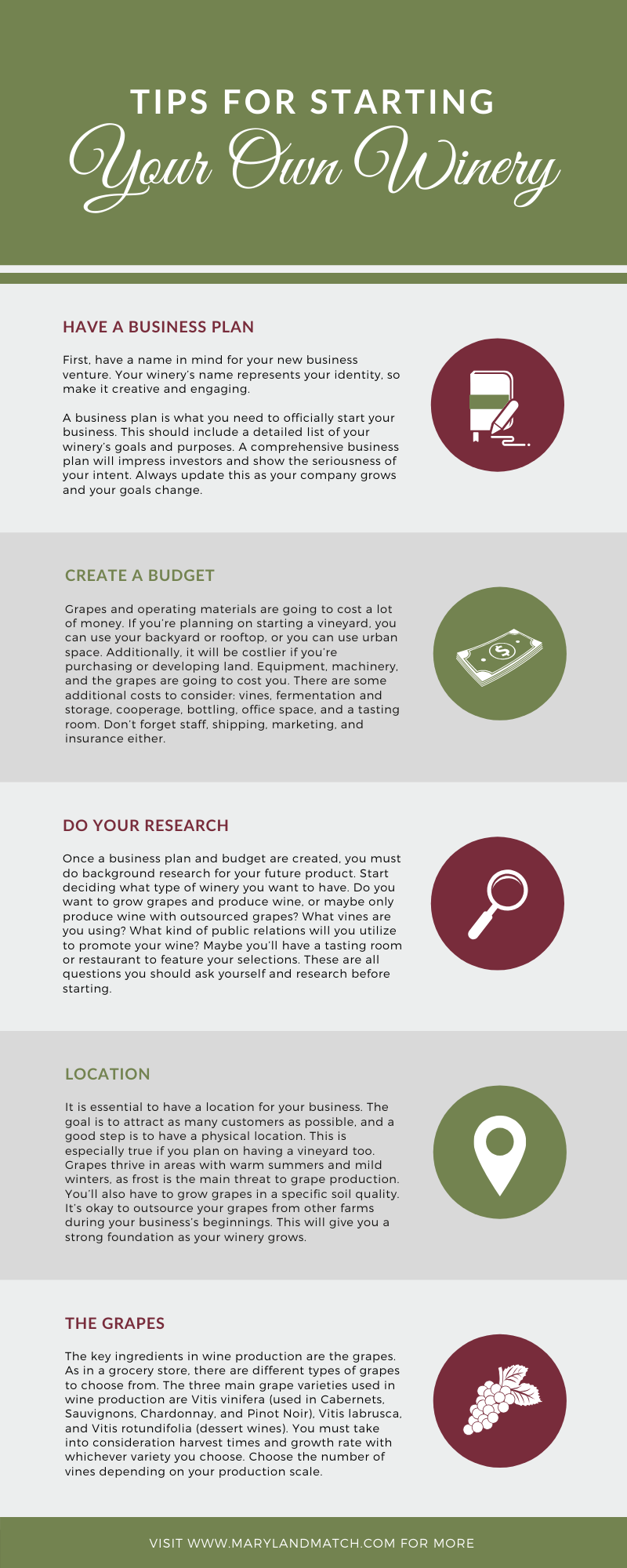Wine-making is a historic industry. This rich process involves grape cultivation, pressing, fermentation, filtration, aging, and bottling. All these steps go into producing the sweet beverage. Many different factors go into each wine you taste. Winemakers must know the grape variety, growing location, and soil type all to make the perfect product. In today’s bustling world, winemakers aren’t limited to having a vineyard. They can outsource their grapes from other growers and focus solely on wine production. Winemakers can also start a winery in urban environments. Knowing the tips for starting your own winery is important for anyone looking to get into the industry.
Have a Business Plan
First, have a name in mind for your new business venture. Your winery’s name represents your identity, so make it creative and engaging. Similarly, a good name is attractive to bankers. If you’re taking out a loan, you want bankers to see your winery as a smart investment; good name will encapsulate that belief. Keep in mind this name will be applied to online tools as well, such as for your website and social media. The catchier your name is, the more people will talk about it.
A business plan is what you need to officially start your business. This should include a detailed list of your winery’s goals and purposes. A comprehensive business plan will impress investors and show the seriousness of your intent. Always update this as your company grows and your goals change.
Create a Budget
Once you’ve created a business plan, obtain all necessary licensing and permits. Check your local and federal wine regulations. To legally operate your winery, you must acquire a permit, register with the FDA, comply with local and state laws, and get approval from the Alcohol and Tobacco Tax and Trade Bureau. You’ll have to get proper shipping licensing and monitor any state excise and sales taxes as well. You may need legal advising for help.
Once you’ve gotten the proper certification, you can formulate a budget. Grapes and operating materials are going to cost a lot of money. If you’re planning on starting a vineyard, you can use your backyard or rooftop, or you can use urban space. Additionally, it will be costlier if you’re purchasing or developing land. Equipment, machinery, and the grapes are going to cost you. There are some additional costs to consider: vines, fermentation and storage, cooperage, bottling, office space, and a tasting room. Don’t forget staff, shipping, marketing, and insurance either.
Do Your Research
Once a business plan and budget are created, you must do background research for your future product. Start deciding what type of winery you want to have. Do you want to grow grapes and produce wine, or maybe only produce wine with outsourced grapes? What vines are you using? What kind of public relations will you utilize to promote your wine? Maybe you’ll have a tasting room or restaurant to feature your selections. These are all questions you should ask yourself and research before starting.
Location
It is essential to have a location for your business. The goal is to attract as many customers as possible, and a good step is to have a physical location. This is especially true if you plan on having a vineyard too. Grapes thrive in areas with warm summers and mild winters, as frost is the main threat to grape production. You’ll also have to grow grapes in a specific soil quality. It’s okay to outsource your grapes from other farms during your business’s beginnings. This will give you a strong foundation as your winery grows.
The Grapes
The key ingredients in wine production are the grapes. As in a grocery store, there are different types of grapes to choose from. The three main grape varieties used in wine production are Vitis vinifera (used in Cabernets, Sauvignons, Chardonnay, and Pinot Noir), Vitis labrusca, and Vitis rotundifolia (dessert wines). You must take into consideration harvest times and growth rate with whichever variety you choose. Choose the number of vines depending on your production scale.
The Production
There are numerous steps to making wine, from harvesting to bottling. These stages include harvesting, crushing and pressing, fermentation, clarification, aging, and bottling. When the harvesting takes place is crucial for the wine’s acidity, sweetness, and flavor. The weather, timing, and whether you’re harvesting by hand or machine can all affect the grapes’ quality.
Once the grapes are harvested and sorted, they are destemmed and crushed. Mechanical presses crush the grapes, and the skins, seeds, and solids produce the juice. For white wine, the juice and solids are separated. After pressing, the juice must be fermented. Cultured yeasts convert all or some of the sugars in the juice into alcohol, depending on if it’s a dry or sweet wine. Fermentation can take over a month. The juice is then clarified to remove dead yeast, tannins, and proteins. Winemakers may add clay or other substances to collect unwanted particles. Finally, the wine is aged and bottled for distribution. Aging increases exposure to oxygen, which brings out more fruitiness.
The Winery
Once you’ve gotten everything together, you can begin wine-making. Your winery is just as important as the wine itself. It’s crucial you determine certain aspects of your winery to increase your business. Is this a small or large-scale operation? Is it family-operated? That could add coziness and connectivity with customers who don’t want mass-produced wine. What will you feature other than wine? Despite being a winery, you’re not limited to only serving wine. You can host events that will attract different types of customers. Another possibility is to expand your operations into grape juice or other grape-related products. This will appeal to those who don’t drink alcohol and children, too. If you want to leave a lasting impression on visitors, turn your winery into an agritourist hotspot. You can even showcase different stages of the wine-making process.
At Maryland Match, we have the branded products you need to start your small business off on the right note. Be sure to check out our selection of custom imprinted products, such as colored matches in bulk, to increase your brand exposure and attract more customers.


